Our mission & strategy
Childpage navigation

“We serve society by educating the next generations of critical and creative thinkers and engaged citizens. (...)”Joël Mesot, President of ETH Zurich
“(...) With our research, we create knowledge and develop technologies to meet the global challenges of our time. We project a sustainable, future-oriented, and innovative image of Switzerland to the world and connect with the global community. Together with our partners from science, business, politics, and society, we rely on the power of teamwork and strive for excellence in everything we do.”
Strategic Planning Environment
A specific strategic planning environment has been developed to help ETH Zurich fulfil its mission and achieve its goals. This reflects its unique qualities as a knowledge institution which is publicly funded while competing globally for the best talent to continue to serve Swiss society.
The strategic planning environment contains three layers: 1) the four-year Strategic Plan of the external page ETH Board for the ETH Domain which provides guidance for 2) ETH Zurich’s Institutional Priorities and its four-year Development Plan for the respective Education, Research, and Innovation (ERI) periods; which provide the framework for 3) ETH Zurich academic and administrative Departments’ individual strategies.
Dialogue
- Core ActivitiesSuccess Factors
- Thematic Areas
ETH Zurich creates value for society and contributes to the sustainable and prosperous future of Switzerland through its core activities of world-class teaching, pioneering research, effective knowledge and technology transfer, and proactive dialogue. It formulates specific institutional objectives and measures, linked to its core activities and success factors.
Further informationETH Zurich's framework, in which it operates, consists of our fundamentals and three thematic areas. The thematic areas entail Environment & Resources, Health & Wellbeing, and Responsible Digital Transformations.
Further informationInstitutional Priorities 2025-2036
What does a leading Swiss university with a global reach look like in ten or twenty years from now? ETH Zurich’s Executive Board launched a process in 2021 to reflect on how ETH Zurich envisions its long-term evolution – as a future-fit university committed to its primary mission of serving society. The ETH Zurich community engaged in defining the institution's long-term strategic priorities, which address cross-cutting issues relevant to the entire institution. The 2025–2036 time frame was selected, as it aligns with three shorter, four-year planning cycles in which the institution regularly engages.
By 2036, ETH Zurich aspires to:

ETH Zurich aspires to continuously serve society as a trusted source of knowledge and to assist societal actors in solving pressing challenges. It will invest in strengthening its ability to communicate and engage with partners from the civil society, policy, the private and the public sector across different channels.

ETH Zurich will continue to evolve as a lifelong learning institution with a robust portfolio of advanced study programmes, as well as learning paths for ETH Zurich employees. This portfolio will be developed in addition to the world-class education on the undergraduate and graduate levels for current and future leaders of academic institutions, the public and private sector.

ETH Zurich aims to operate seamlessly and integratively, enabling it to navigate complex environments while fostering both interdisciplinary and transdisciplinary collaboration. Organizational agility and a commitment to reinvention will be crucial for the institution to excel in delivering its core activities.

ETH Zurich aspires to embed AI Tools across the institution including in learning, teaching, research, and administration in a responsible, transparent, and ethical manner. The institution acknowledges that although AI can serve as an enabler, it also brings along significant ethical risks which can negatively impact individuals and our society at large.
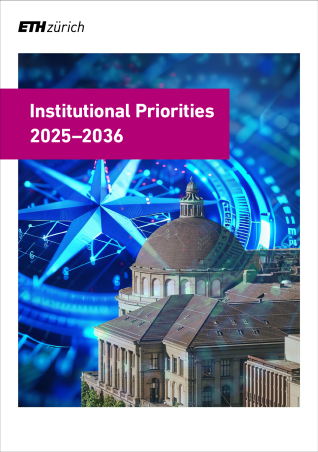
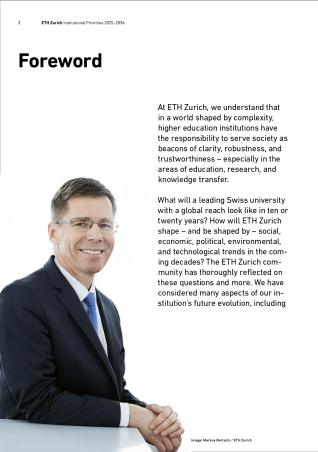
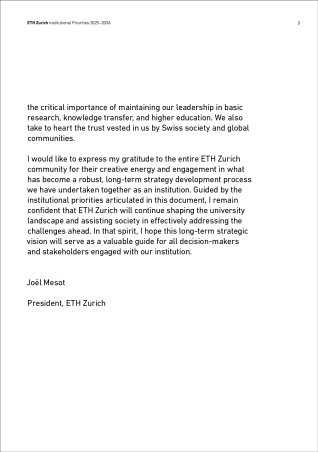
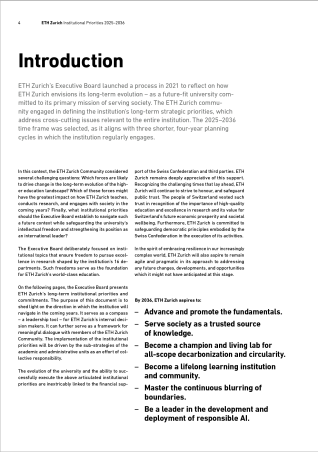

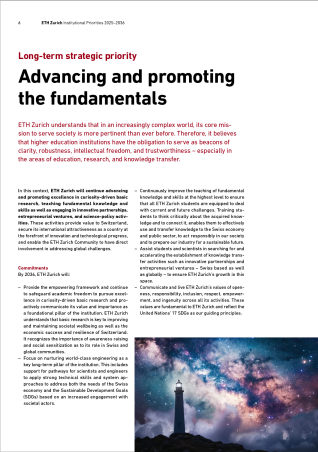
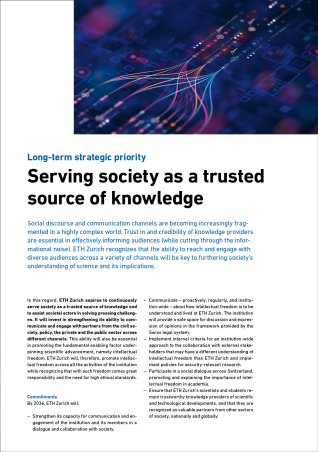
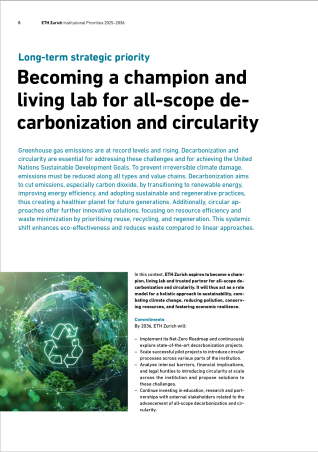
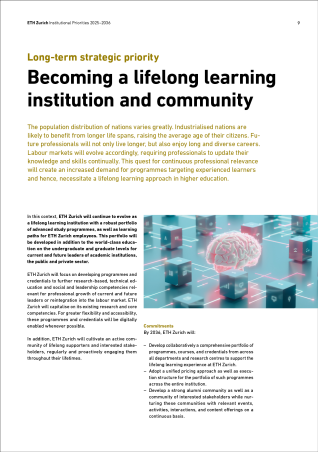
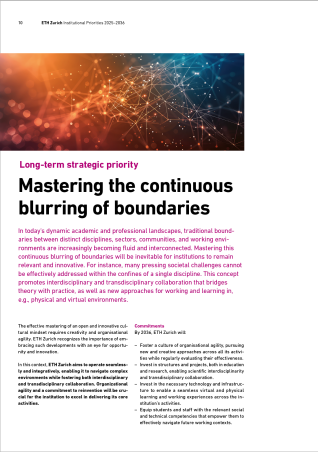
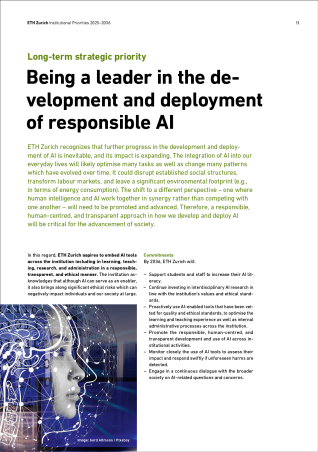

Development Plan 2025-2028
ETH Zurich creates value for society and contributes to the sustainable and prosperous future of Switzerland through its core activities of world-class teaching, pioneering research, effective knowledge and technology transfer, and proactive dialogue. It formulates specific institutional objectives and measures, linked to its core activities and success factors.
The institution fosters a unique culture of quality that understands the value of continuous improvement directed towards the evolving expectations and demands of society, students, professors, and staff members. The Development Plan with its qualitative objectives and associated measures also serves as ETH Zurich’s quality strategy. To ensure its implementation, subsidiarity and personal responsibility remain the core element of ETH Zurich's management and quality culture.

ETH Zurich prioritises in-person teaching to develop independent, creative, and critical thinkers who take responsibility as active members of society and help shape a sustainable future. Research-centred, interdisciplinary training, and continuing education enable its students and alumni to identify challenges and collaborate with stakeholders to find solutions which pay off – especially in times of crisis. ETH Zurich fosters a dynamic learning environment where lecturers have creative freedom, and where teaching methods continuously evolve to leverage the latest technologies and latest scientific discoveries.

Outstanding fundamental science discovery forms a cornerstone of ETH Zurich’s education and serves as the engine of innovation in today’s knowledge-based world. Optimal framework conditions are necessary to enable and inspire excellent performance to exploit the immense potential of basic research for innovation. These conditions are supported by federal and third-party funding, and collaboration with the private sector. ETH Zurich supports interdisciplinary collaborations of researchers both within institutional networks, as well as with other scientific partners and industry. The aim is always to expand the boundaries of knowledge, promote sustainability, and open new strategic areas of action and applications to maintain and further expand ETH Zurich’s international leadership position.

ETH Zurich recognizes that knowledge and technology transfer are crucial for societal progress and economic prosperity. In addition to direct cooperation with partners from industry and government – for example, through joint research projects and science-based policy advice – ETH Zurich’s impact on the economy and society through start-ups remains as strong as ever. One of the key ways ETH Zurich fosters a vibrant entrepreneurial ecosystem is by licensing research results and supporting the creation of spin-off companies. These successful start-ups receive valuable guidance, access to essential infrastructure, and connections within the business community during their critical early stages.

ETH Zurich believes in an open dialogue with society, recognizing that scientific progress and far-reaching technological change require collaboration with a wide range of stakeholders. Thus, it works closely with the public, alumni, policymakers, and businesses. The leading researchers, employees, and alumni of ETH Zurich provide expert guidance and a sound basis for decision-making, thus making a key contribution to a fact-based, democratic discourse. At the same time, ETH Zurich is committed to pushing the boundaries of science communication and policy advice, fostering proactive societal engagement for a positive impact.

ETH Zurich’s success hinges on several key factors: its people, the recruitment and retention of excellent scientists at all levels who conduct pioneering research and provide world-class teaching and education, and the development of staff and students into highly qualified experts and managers; strong local, national, and international networking with diverse interest groups; academic autonomy and a culture of support, trust, and responsibility; a governance with broad participation rights in addition to financial and academic autonomy combined with a strong sense of responsibility; its campus locations both in and outside Switzerland; and top-class infrastructure internationally recognized as strategic assets in attracting and retaining worldwide leading scientists and talents.
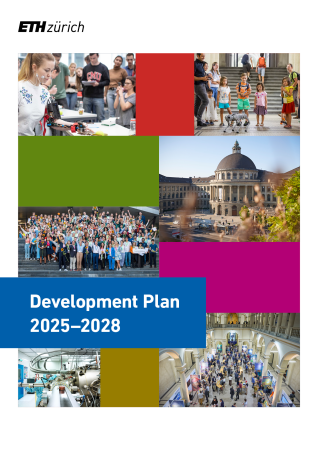
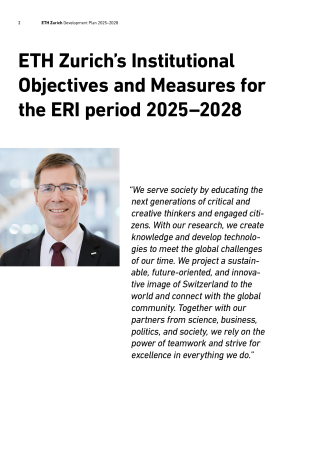
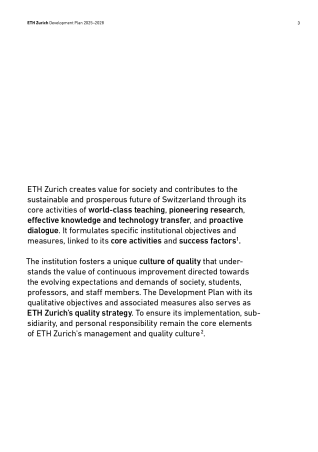
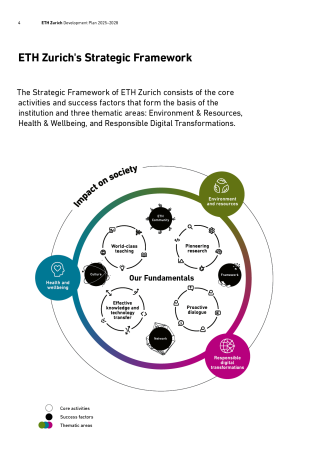
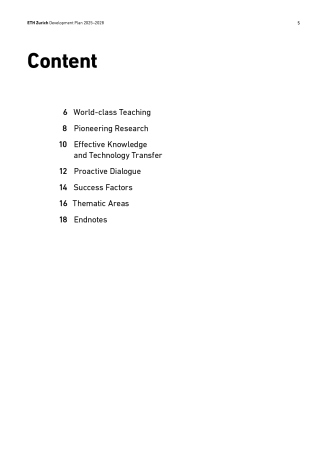
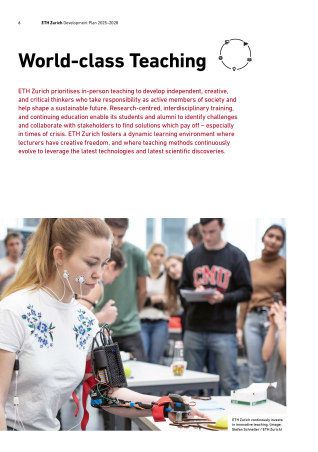
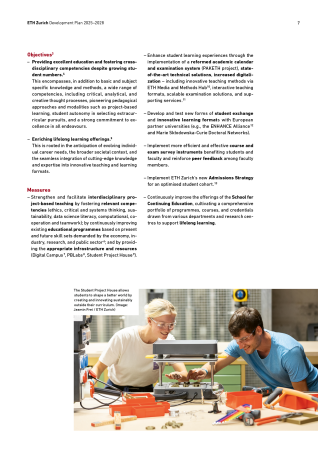
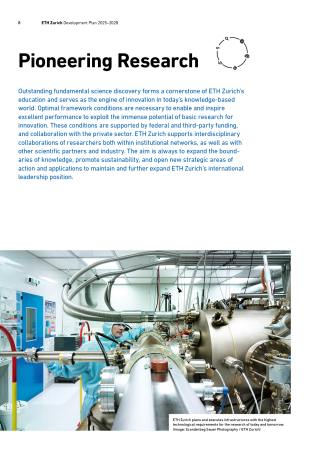
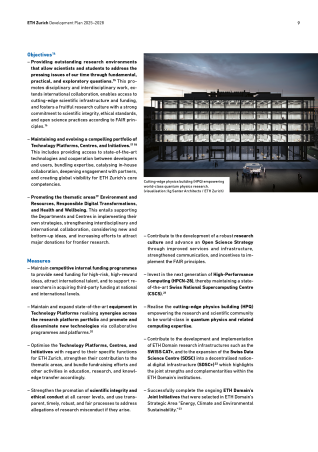
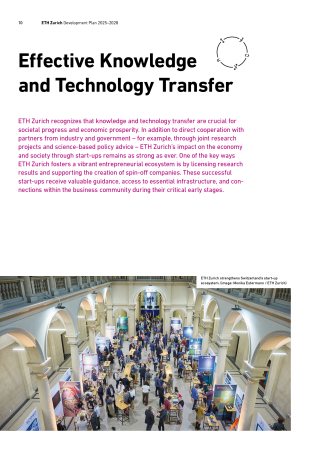
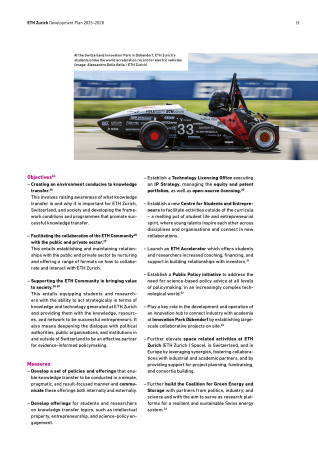
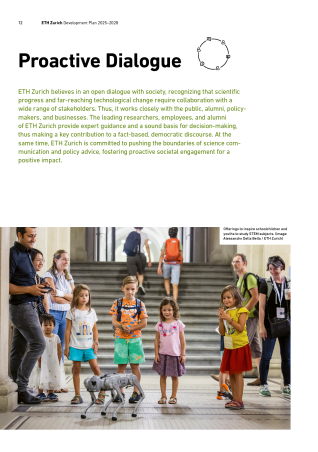
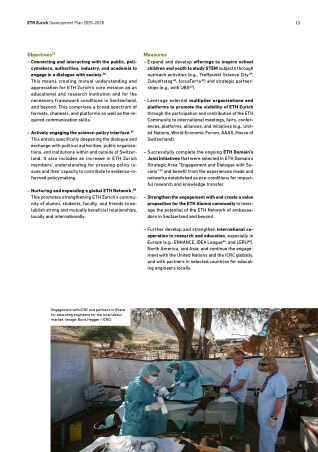
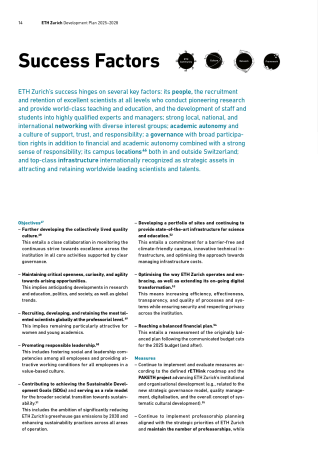
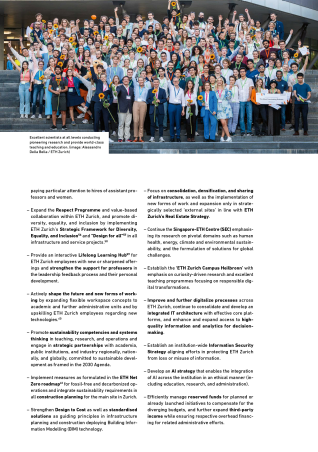
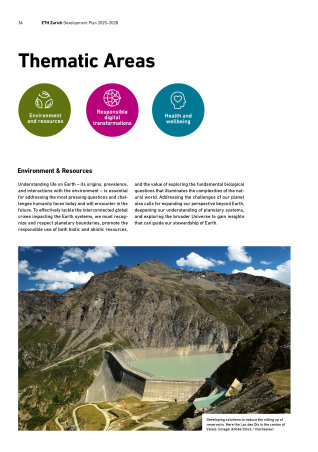
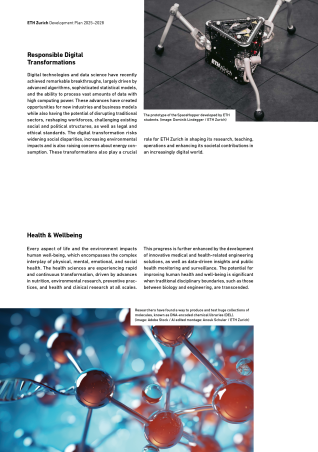
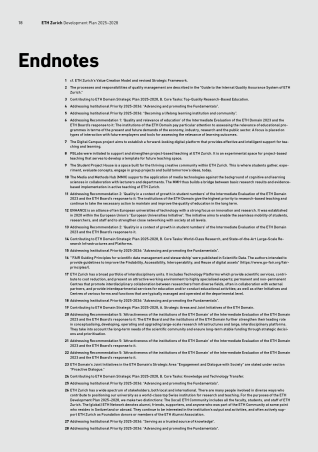
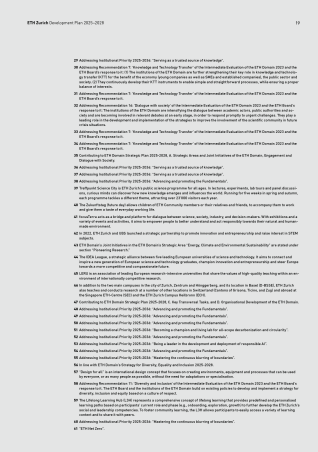

Thematic Areas
Expanding scientific expertise and passing it on to the next generation is the raison d’être of our university. For this reason, we are continually developing the diversity of our research and teaching activities while at the same time keeping our focus on a few core areas that are of particular importance for the future of Switzerland.
Basic research is the foundation for the success of ETH as a whole and particularly for mission-oriented research targeted at solving global challenges. Interdisciplinary collaboration will be strengthened in all thematic areas, thereby promoting the translation of research results into real-world applications and teaching.

Understanding life on Earth - its origins, prevalence, and interactions with the environment - is essential for addressing the most pressing questions and challenges humanity faces today and will encounter in the future. To effectively tackle the interconnected global crises impacting the Earth systems, we must recognize and respect planetary boundaries, promote the responsible use of both biotic and abiotic resources, and the value of exploring the fundamental biological questions that illuminates the complexities of the natural world. Addressing the challenges of our planet also calls for expanding our perspective beyond Earth, deepening our understanding of planetary systems, and exploring the broader Universe to gain insights that can guide our stewardship of Earth.

Digital technologies and data science have recently achieved remarkable breakthroughs, largely driven by advanced algorithms, sophisticated statistical models, and the ability to process vast amounts of data with high computing power. These advances have created opportunities for new industries and business models while also having the potential of disrupting traditional sectors, reshaping workforces, challenging existing social and political structures, as well as legal and ethical standards. The digital transformation risks widening social disparities, increasing environmental impacts and is also raising concerns about energy consumption. These transformations also play a crucial role for ETH Zurich in shaping its research, teaching, operations and enhancing its societal contributions in an increasingly digital world.

Every aspect of life and the environment impacts human well-being, which encompasses the complex interplay of physical, mental, emotional, and social health. The health sciences are experiencing rapid and continuous transformation, driven by advances in nutrition, environmental research, preventive practices, and health and clinical research at all scales. This progress is further enhanced by the development of innovative medical and health-related engineering solutions, as well as data-driven insights and public health monitoring and surveillance. The potential for improving human health and well-being is significant when traditional disciplinary boundaries, such as those between biology and engineering, are transcended.
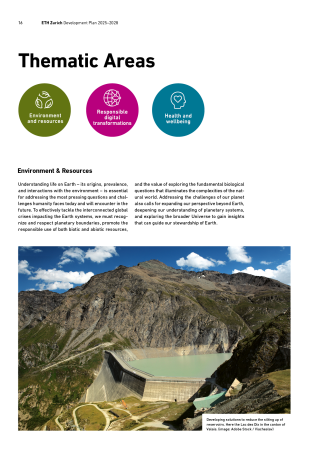
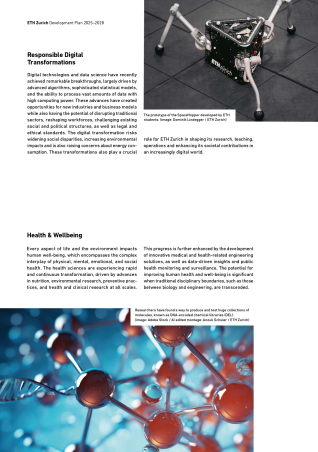
Institutional accreditation
ETH Zurich received institutional accreditation from the Swiss Accreditation Council on 24 September 2021 in accordance with the HEdA. The accreditation is valid for seven years, until 23 September 2028. The external page accreditation decision and procedure report of the Swiss Agency for Accreditation and Quality Assurance (AAQ) were published by the Swiss Accreditation Council on 18 October 2021. The Download self-evaluation report (PDF, 1.6 MB) (available in German only) on which the accreditation is based was published at the same time as the accreditation decision.

